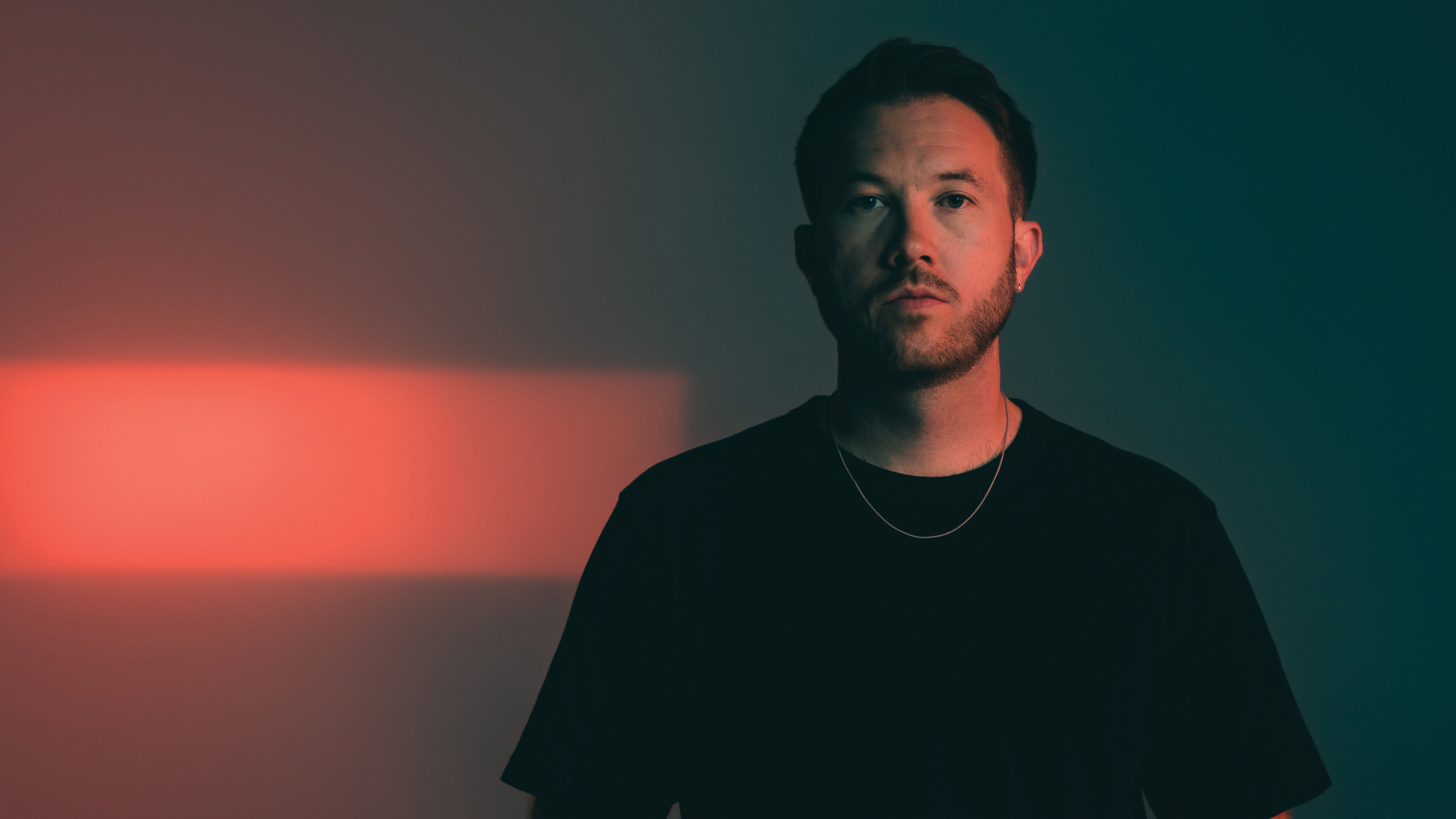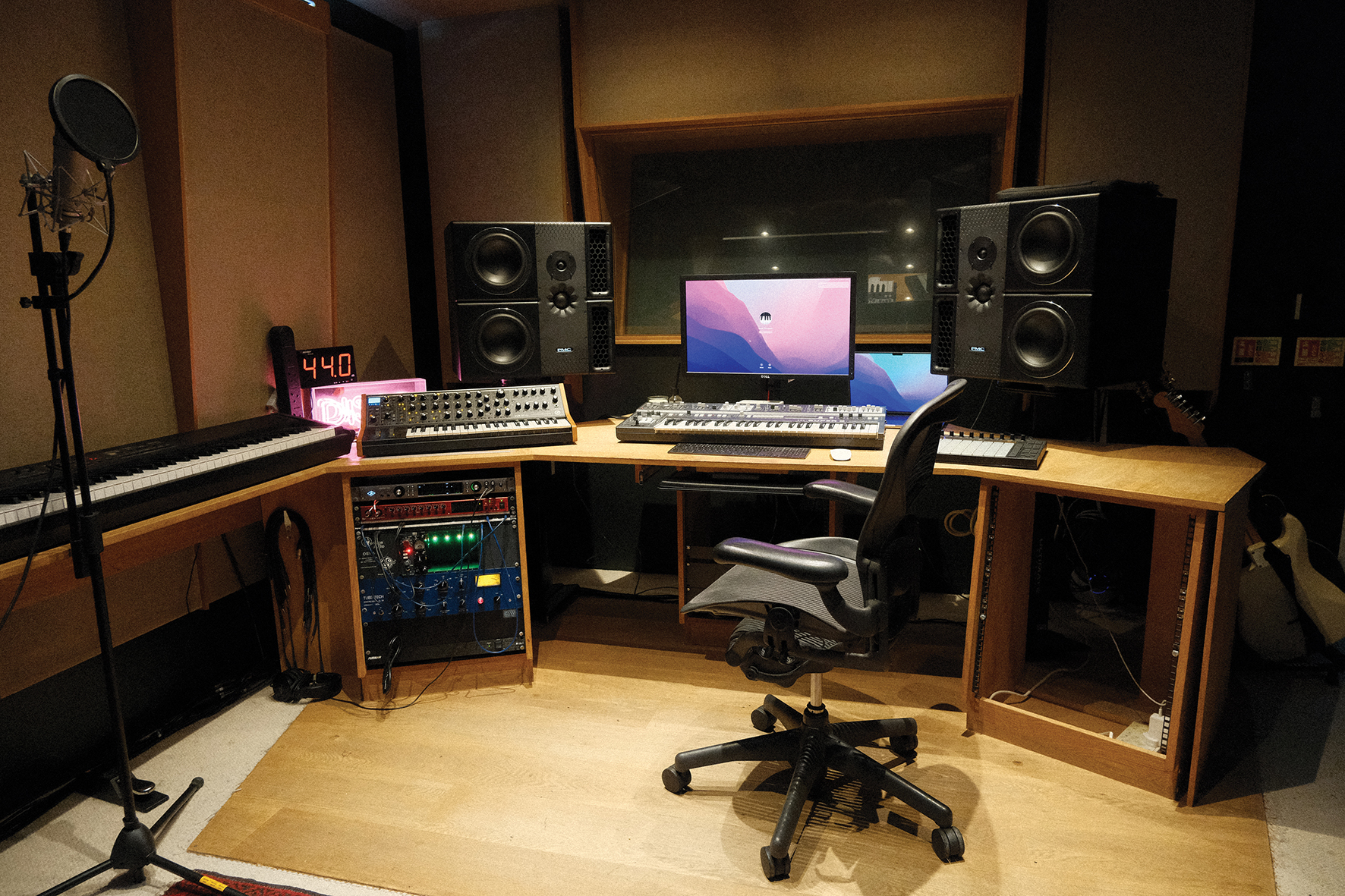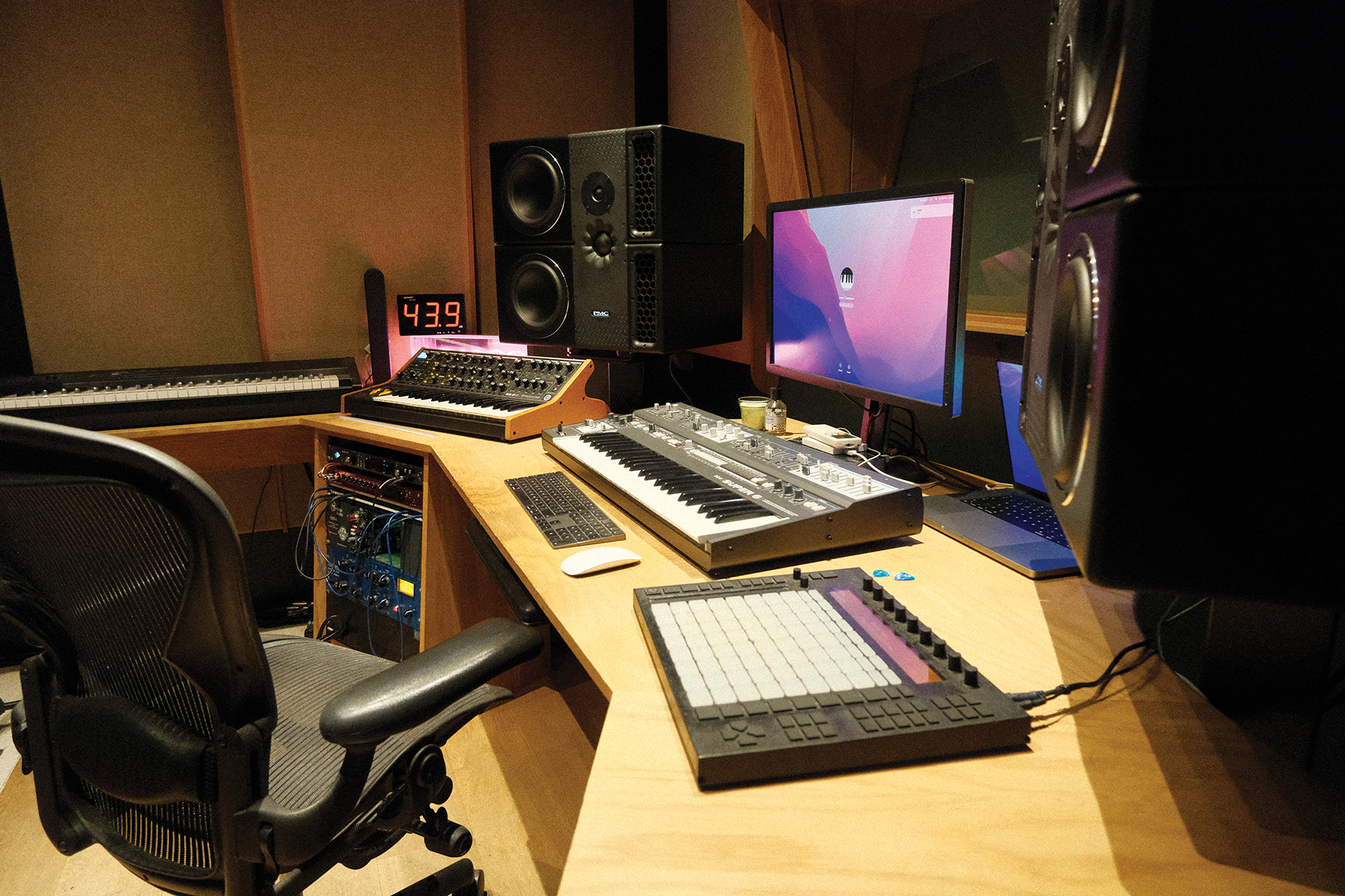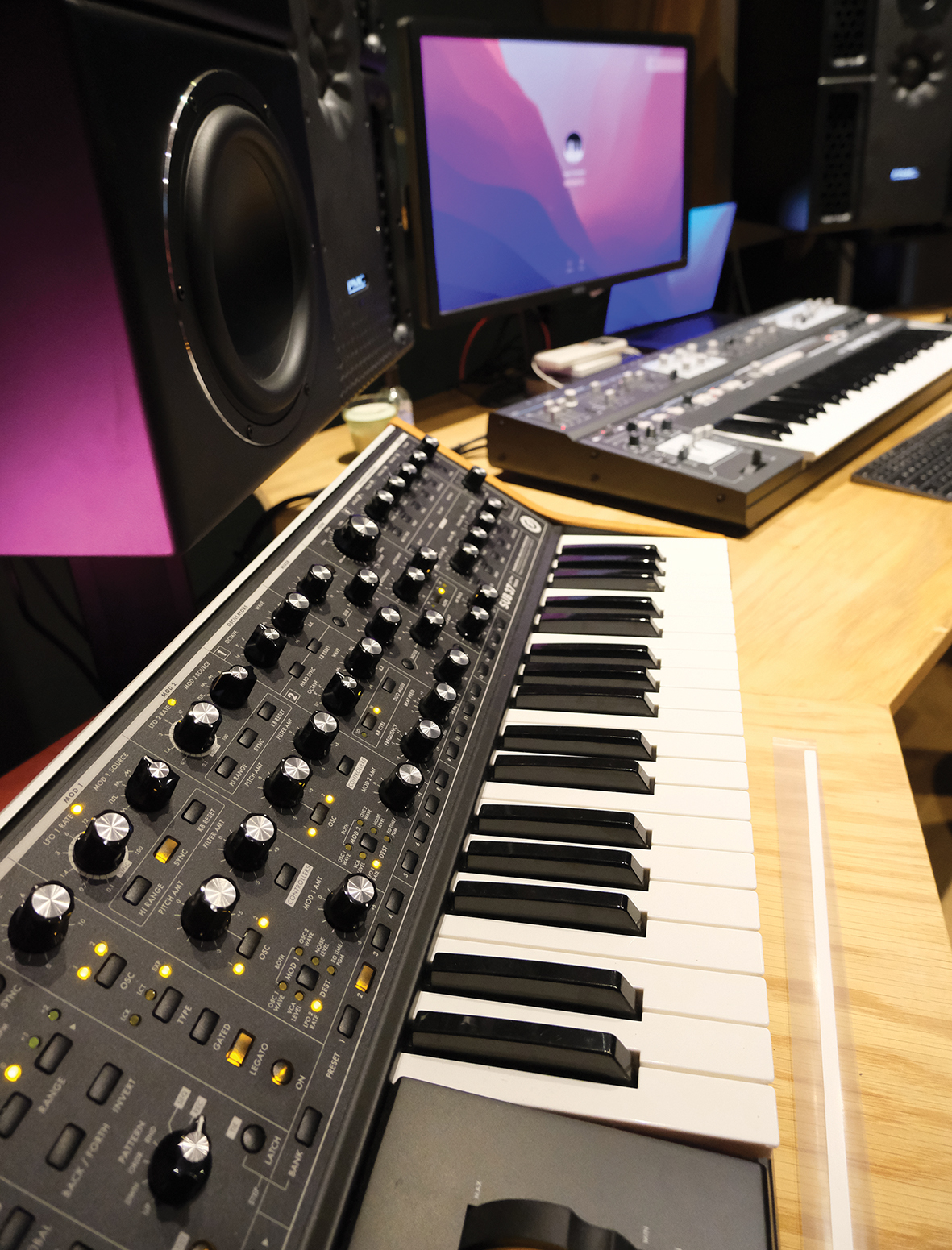Lewis Thompson: "The best ideas happen as mistakes – selecting the wrong preset or putting the wrong plugin somewhere"
One half of DJ duo Just Kiddin’, Lewis Thompson has production and writing credits on eight Top 10 UK singles. We speak to one of the most prolific dance producers in the game

Want all the hottest music and gear news, reviews, deals, features and more, direct to your inbox? Sign up here.
You are now subscribed
Your newsletter sign-up was successful
Ever worried that you haven’t got the talent to make it big in the music business? Well, take a leaf or two out of Lewis Thompson’s book.
He might not have the self-belief either, but he certainly has the sheer determination, hard work ethic and, well, isn’t afraid to exaggerate when it comes to the truth on occasion. And now he’s had a smash hit with David Guetta, and produced and co-written some of the UK’s biggest hits.
These include Joel Corry’s Sorry, Lonely and Out Out, the number 1 single with MNEK Head & Heart, plus Anne-Marie and Little Mix’s collaboration Uh Oh, not to mention the international smash Crazy What Love Can Do with David Guetta, Ella Henderson and Becky Hill. Who needs talent then? He’s also got some great words of wisdom...
How did you start out in music production in the first place?
“I’ve always had a curiosity for music. I played guitar in bands when I was younger but never got anywhere. I really got into electronic music a few years before university. When I got to uni I met a club promoter on a night out and told him I was a pretty established DJ. This was a complete lie – I’d never touched a pair of decks in my life!
“The next night he texted and asked me to come down for a set, I almost ignored the message, but instead, ran to the shop, burnt some of my fave tunes onto CD, showed up and somehow blagged it. It was almost definitely an awful set, but that decision to show up and play was definitely one of the best I’ve made. It changed my life as I caught the bug for DJing, which led me to make my own records.”
When and how would you say you became successful, or at least able to make a living from music?
Want all the hottest music and gear news, reviews, deals, features and more, direct to your inbox? Sign up here.
“The main reason why I believe I’ve had any success is from my drive, determination and resilience. I’ve been so used to people telling me ‘no’. At school I wasn’t allowed to study music, because I couldn’t read sheet music. I’ve had so many managers , A&Rs and record labels tell me ‘no’. Handling rejection is such a big part of it. But as bad as rejection feels, proving people wrong feels so much better.
“I’ve always been quite competitive, so that’s how I thrive. Also, being good at anything takes time. I’m a big believer in the 10,000 hour rule. I started making music in 2008 so this has not been an overnight success by any means. Talent will get you so far, but the majority is how much you want it. I’ve never really believed I’m particularly talented, this is what really grounds me and makes me work harder than others.”
What is your production philosophy?
“I’d say simplicity. Simple always wins, be it a melody, production, arrangement, lyrics etc. As soon as one of these elements is over complicated, I think the song suffers. Secondly, I’d think about why you’re making music. I make records for myself and try to create things that I find exciting. If you start making music for other people or to make money then you’re probably in the wrong industry.”
When did you discover the computer music route to music production?
“I downloaded Ableton in 2008 and it changed my life. I just found it fascinating how I could sketch ideas down and start creating. Me and my brother would sit at home for weekends on end messing around on Ableton. ”
Tell us about the gear in your studio.
“For my monitors I’ve recently invested in some new PMC 8-2 speakers, which I’m loving working on. For my microphone I’ve got a Neumann u87 Ai but have just purchased a Sony C800G which I can’t wait to use. This mic chain then goes into a 1073 preamp followed by a Tube-Tech CL1B- meaning my vocals are sounding pretty nice before they’re even in the box.
“I’ve then got a synth collection including a Roland Juno-60, Moog Sub 37, Sequential OB-6 and recently an UDO Super 6, which might be my favourite of the bunch. All these route into a patchbay so I can send them into any preamps or compressors I might want to.”

What are your favourite plugins?
“u-he Diva. The ultimate analogue emulation, it’s definitely the closest virtual synth I’ve found to the real thing. I love how easy it is to use and how versatile it is – the templates for different synths are really useful.
“VPS Avenger. I used the Vengeance sample packs when I first got into making music so was keen to try this synth out. The sounds are just so ‘finished’, I really love it. Everything from synths, basses, pianos, strings, guitars – it’s got it all. People love Nexus but I think this is way better.
“Soundtoys Bundle. I love how experimental Soundtoys plugins make me. It’s so good for those ‘happy accidents’, especially with the Effect Rack presets where you can use multiple plugins at once.
“u-he Repro. This models the Pro-One synth, which I love the sound of. It’s great for bass sounds, arps, leads and sounds exactly like the real synth.
“Sonnox Oxford Envolution. This is the best transient shaper I’ve ever used. It’s super visual and easy to understand how you’re actually shaping a sound. Great on drums!”
How do you tend to start a track?
“I usually start with some sort of basic chord or melody, just an 8-bar loop to start building a song around. I have a huge folder of chord progressions and melodies I make. I’ll just have a day of creation where I mess around in one project with no judgement and save anything I think is good. I then bring these banks of chords/loops into sessions to write to.
“I’ve learned that bringing in a fully-produced record into a vocal/writing session is really limiting. Writers want freedom, so keeping things stripped back is really important. I don’t even mess with drums until we have the basic song written.
“Sometimes myself or another writer will have a vocal melody too – that’s a fun way of writing. From that melody I’ll try and figure out some chords or bass notes that feel right with it. It’s the reverse approach to the above.”
Do you have any production tricks?
“I don’t have loads of different tips or tricks with production, if I’m honest. I usually find the best ideas happen as mistakes – selecting the wrong preset or putting the wrong plugin somewhere. So make sure you create an environment with yourself and others where mistakes are welcome; they make the best ideas.
“One thing I do differently is commit a lot quicker to sounds. This started out of a limitation, because my old Mac was starting to get really slow and laggy. So, I got into the habit of bouncing synth/bass sounds out as soon as I made them, and seeing it as audio in Ableton. Basically it’s the same approach to using analogue gear, where you think ‘close enough, let’s commit’. I think the decisiveness of it makes you work so much faster; it stops you tweaking and dwelling.”

How do you know when a track is done?
“I know some people who never think songs are finished and keep pushing, version after version, until it’s done. I don’t really work in this way and usually the best records happen really quickly and I’m not even thinking about it. I go into a state of flow and two or three hours later, I come out with something. If a song is taking forever to complete, something isn’t right.
“The best songs are the easiest to produce and finish, so maybe the song isn’t right? Maybe it’s the arrangement? Or the sound choices in the production? If I’m finding something really difficult to finish, I’m learning to put it down and let my mind sit on it for a few weeks. Somewhere down the line, a few weeks or months later, an idea will come to me on how to finish it.”
What’s on your gear wishlist?
“A Sony C800G, Telefunken 251, Roland TR-8S, Roland SH-101 and Chandler TG-2.”
Are you involved with any collaborators on your projects?
“I’m always collaborating in every project I’m involved in. Individuals rarely make records; it’s teams of people. When I first started making music I wanted to do everything on my own, from songwriting to mixing. Looking back in hindsight, this was ambitious but a bit of a mistake. Being open to collaborate with writers, producers and singers really changed my approach to making music.
“Today, I love collaborating with people. I’m lucky to have some amazing people around me that I do this with, that have turned out to be some of my closest friends, too. The biggest hurdle with collaborating is communication. When you’re in a session, it’s vital to read the room and make sure everyone is on the same page, heading for the same end goal.
“If one person is heading in a different direction or something isn’t clear – you’ll end up with a messy hybrid song that’s been shoe-horned with multiple ideas.”
Which track do you wish you’d produced and why?
“Calvin Harris' We Found Love. I find it hard to process that Calvin is the only writer and producer on this record – 100% to him. That’s so rare to see, some songs have 15 writers and four producers on them! The writing is so clever and smart. I love how the verse melody mirrors the chorus so it’s already familiar. That chorus lyric is just so relatable too. Fair play Calvin.”

Any advice for playing live?
“Advice here would be to make sure you’re prepped. I learned this the hard way. If you’ve got gigs coming up, take time away from making records and dedicate time to being prepared for a set or live show. Sort out playlists, make edits, prepare for different crowds etc. I really feel like so much of the work is done before the set. And showing up feeling really confident you’ve done your homework really comes across, too.”
What about studio advice?
“First, make sure you’re showing up and putting the time in. There’s thousands of people that would kill to make music for a living, so don’t forget that. If you’re not focussed and putting time into perfecting your craft, someone who wants it more will come and get it. Second, figure out your process and stick to it. I like to go into sessions prepped with loads of song-starters to vibe with. Find your way and stick to it.”
And do you have any other advice from the industry that you can pass on?
“Be resilient, embrace rejection and stay humble. The music industry is a relationships business. If you want long-term success be nice to people and work hard.”
What do you have planned?
“2023 is going to be a big year for me. I love making records and not overthinking it, so I plan on putting a lot out. I’ve got collabs coming with both Sonny Fodera and Paul Woolford followed by some new solo records. I’m really excited about this year, I feel like I’m sitting on some of the best records I’ve ever made.”
Lewis Thompson’s Enchanté is out now on RCA.


Andy has been writing about music production and technology for 30 years having started out on Music Technology magazine back in 1992. He has edited the magazines Future Music, Keyboard Review, MusicTech and Computer Music, which he helped launch back in 1998. He owns way too many synthesizers.
